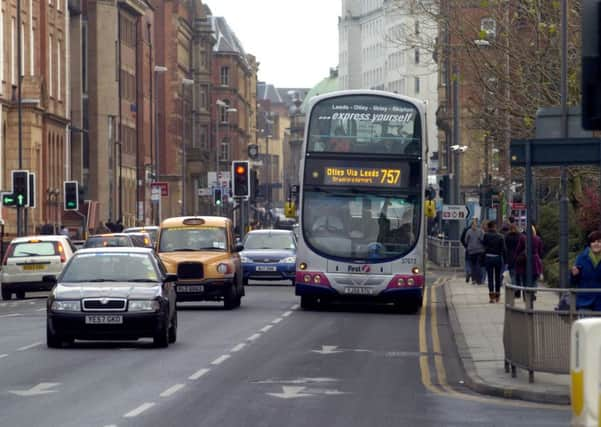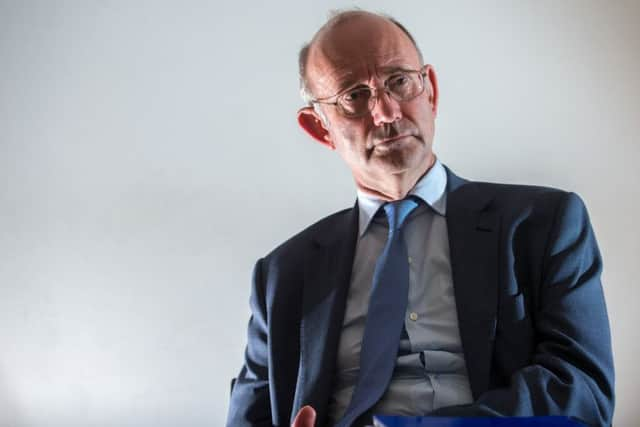Yorkshire transport 2018: Contactless payments and better-trained bus drivers on our roads


It’s one of the trickiest problems politicians and civil servants have to wrestle with - how best to keep Yorkshire’s roads moving when they are becoming ever more congested with traffic.
Department for Transport figures show there were 27.3 billion vehicle miles covered in the region in 2016, the highest total on record and 700,000 higher than the previous year, a trend with obvious implications for journey times and air quality.
Advertisement
Hide AdAdvertisement
Hide AdIn the second part of The Yorkshire Post’s report on transport developments in the region in 2018, local authorities and transport operators have revealed their plans to increase capacity and improve the experience of road users.


First Bus, which has 3,500 staff across Yorkshire and carries 550,000 people a day on its 1,400 vehicles, is promising a host of changes.
Contactless payments are being introduced, starting in West Yorkshire in the middle of January and followed by York in February and South Yorkshire by the end of the year, in bid to end the frustrating wait for passengers fumbling with change.
“It is simple but it will transform the perception of bus travel and also some of the frustrations about journey speed,” said First’s Managing Director for West Yorkshire, Paul Matthews.
Advertisement
Hide AdAdvertisement
Hide AdThe firm is also re-training all of its staff in the region to help its employees better understand customer behaviour and manage their own.


“There is a perception that bus drivers are rude and unfriendly and sometimes some are, we have to accept they are, but mostly our 3,000-plus staff try to do the best they can for customers”, said Mr Matthews.
First’s most eye-catching work will be in Leeds, where a quarter of a billion pounds of improvement works funded by the public and private sector have been promised in the aftermath of the city’s failed Trolleybus scheme.
As part of this investment, 44 new vehicles with wireless internet, USB charging points and next-stop announcement similar to buses in London will arrive in the city by the end of March. A further 60 new vehicles, all with a distinctive green livery, will be in place by the end of 2018.
Advertisement
Hide AdAdvertisement
Hide AdRival Transdev, whose 36 buses between Leeds, Harrogate and Ripon already have USB power, wifi and next-stop announcements, plans to complement this with a fleet of zero-emission electric buses in the spa town this Spring. The Volvo electric buses, part of a £4.2m project funded by the firm and the Government, are the first of their kind in the UK and will be charged at Harrogate bus station, meaning the town’s bus network will now switch to electric operation.
Contactless payments will be accepted on all Transdev buses and extra capacity is promised on the Aireline route between Leeds, Shipley and Keighley and the Dalesway service between Skipton and Keighley. Three more high-spec Euro 6 low emission buses will be added to the Coastliner route between Leeds, Scarborough and the coast.
West Yorkshire Combined Authority’s Bus 18 programme, to be delivered by the end of this year, includes a raft of pledges to encouraging greater bus use. A spokesman said: “We will see the ongoing introduction of newer, cleaner vehicles and the Combined Authority is backing work by the initiative’s partners to introduce a new affordable day ticket that young people would be able to use to go anywhere across West Yorkshire.
“Early in 2018, we are also hoping to announce enhancements to Elland Road park and ride services and improvements to city centre bus stop arrangements for the thousands of people using the services each week.
Advertisement
Hide AdAdvertisement
Hide Ad“Working closely with our partners at Leeds City Council and bus operators, we will, in 2018, take the first steps to transforming the city’s bus services. New vehicles will enter service, contactless payments will start becoming a reality and we will be installing many more real-time display screens at bus stops.”
Cyclists
Among the improvements for cyclists will be the completion of the £8.1m Leeds City Centre Cycle Superhighway and a £3.1m segregated route on the Bradford Canal Road Corridor.
Resurfacing work will take place on cycle routes on the Airedale Greenway, while in South Yorkshire, where a high proportion of journeys to work are less than 2km, officials will develop plans for better cycling and walking.
Roads
Many of the major road projects planned for 2018 in Yorkshire relate to the longstanding issue of connecting east and west as well as north and south.
Advertisement
Hide AdAdvertisement
Hide AdIn North Yorkshire, officials hope to make progress on creating a bypass through Kex Gill gorge between Harrogate and Skipton, with the existing A59 frequently blocked by landslides.
Major improvements are planned to traffic flow at Junction 47 of the A1 near Flaxby, where the A59 meets the A1M and the site of several planned developments which will put the existing infrastructure under strain.
Though the prospect of a relief road for Harrogate and Knaresborough remains uncertain, a project this spring at High Bond End, between the two towns, is planned to cut the number of queuing vehicles.
And 2018/19 could be a crucial year for the campaign to dual part of the A64 east of the Hopgrove roundabout near York, a well-known traffic hotspot.
Advertisement
Hide AdAdvertisement
Hide AdTo dual the road up to the Jinnah Restaurant south of Barton Hill would cost around £250m and require a funding bid to Highways England.
In South Yorkshire, officials hope to set out plans for improvements around junction 33 and 34 of the M1, where traffic is said to be limiting the economic potential of the area and poor air quality saw a nearby school closed.
The Highways Agency says the final sections of the A1 between Leeming and Barton will be upgraded to motorway standards by the winter, while work will start on widening the junctions at 27 and 28 of the M62 in the spring.
And in Hull, work on the long-awaited Princes Quay Bridge will start in late 2018, several months too late for the City of Culture year.